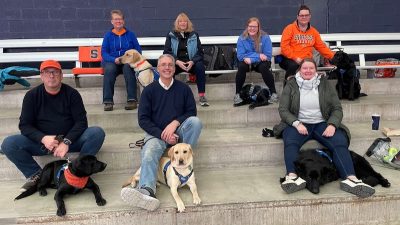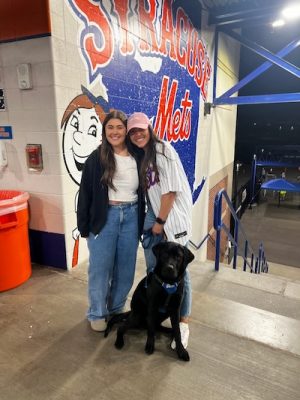Have you met Tarzan or Juan yet on campus? These latest members of the University community are hard to miss, with their friendly dispositions, shiny coats and wagging tails.

Tarzan, a one-year-old black lab, and Juan, a four-month-old yellow lab, are puppies being raised by good friends Arianna Kuhn ’25 and Megan Panny ’25 for Guiding Eyes for the Blind, a nonprofit organization that trains and cares for guide dogs for people with vision loss.
Kuhn, a biology major in the College of Arts and Sciences, and Panny, a dual degree English major in the College of Arts and Sciences and School of Education, became involved through outreach being done on campus by Mary Oonk, the organization’s local volunteer region co-coordinator.
Headquartered in Yorktown Heights, New York, Guiding Eyes for the Blind has puppy raisers along the Eastern Seaboard from Maine to North Carolina, including in Central New York. Founded in 1954, the organization, with more than 1,700 volunteers, provides all of their services free of charge.
Kuhn was interested in the organization after reading about its mission. “I am passionate about giving back to the community and wanted to have a positive impact on an individual that would benefit from the services of Guiding Eyes,” she says. “In addition to the opportunity to volunteer, the chance to combine my devotion to helping others and my love for dogs drew me to want to take part in this experience.”
“When I saw the opportunity to be involved through Syracuse University, it was one I was excited about. This program has allowed me to help others while also fulfilling the love I have for animals.
Megan Panny ’25
Panny wanted to get involved after seeing the impact it had on people’s lives firsthand. “My hometown is near the Guiding Eyes for the Blind headquarters, which has given me the ability to see how the program works throughout my life,” Panny says. “When I saw the opportunity to be involved through Syracuse University, it was one I was excited about. This program has allowed me to help others while also fulfilling the love I have for animals.”
The organization was first connected with the University through a simple phone call: Oonk called the JMA Wireless Dome box office to order basketball tickets and started talking to the representative about the work of Guiding Eyes for the Blind. “I explained to him the work I do for Guiding Eyes for the Blind, and that socialization of these puppies is a huge part of that and asked if there was a way we could bring the dogs into the JMA Dome for training,” Oonk says. “The next thing I know, I got a meeting with the entire team at the JMA Dome.”
Training Space for Pups

The JMA Dome offers a good training experience for the puppies. Guide dogs must navigate large spaces, like an arena, with stairs, elevators and expansive areas.
“Mary approached us about hosting a one-time training class with the volunteers and puppies, but we worked with them to create something more where they could come into the JMA Dome for regular training and even attend a women’s basketball game so that the puppies could be exposed to a live event in the Dome,” says Pete Sala, vice president and chief facilities officer. The organization has had a relationship with the JMA Dome since 2015—volunteers come approximately once a month to walk the arena, attend a game or train.
While the experience in the Dome is invaluable, Oonk says the group was hoping to find a way to get students involved with the program. A University campus makes an ideal learning and socialization space for raising guide dogs, with a variety of spaces and situations and groups of people.
Life-Changing Experience
In Summer 2022, Stephen Kuusisto, University Professor and director of interdisciplinary programs and outreach for the Burton Blatt Institute, met with local volunteers and their puppies and shared his story about how his life changed since getting his first dog, Corky, from Guide Eyes for the Blind.
“A lot of things were going on in my life that were difficult, including losing an adjunct teaching job and becoming unemployed,” says Kuusisto. “So I suddenly thought, well, here I am, really visually impaired, and have nothing on the calendar. Why not get a guide dog?”
His life was forever changed. Kuusisto went from not really going anywhere without the dependence of a friend and their schedule to going wherever he wanted, whenever he wanted.
“I spent the next month walking everywhere from country roads to Midtown Manhattan, learning that I could trust this dog with my life,” Kuusisto says.
Kuusisto, who is forever grateful for the volunteers at Guiding Eyes for the Blind, connected Oonk with the Student Experience team during the Fall 2022 semester, who was very supportive in finding ways to gain student volunteers for the puppy raising program. “We are so grateful for the University’s support. Everyone we’ve worked with on campus has become an integral part of the Guiding Eyes mission,” says Oonk.
The only stipulation for students wanting to be involved with raising puppies on campus is that they cannot live in North Campus student housing; puppies in training are, however, allowed in South Campus housing. But that was no problem; even for those students who live on North Campus or perhaps have a busy schedule that wouldn’t allow for puppy raising, there are still many ways to get involved with the program.
The campus program got a boost when the Guiding Eyes for the Blind group was invited to table at the Fall 2023 student involvement fair. Kuhn and Panny saw the opportunity to take their love for dogs and make a difference in someone’s life.
Invaluable Lessons in Community
Kuhn says one of her favorite parts about this program is the community of Guiding Eyes volunteers.
“These individuals have taught me countless invaluable lessons outside of just puppy raising that I will carry with me into my future endeavors,” Kuhn says. “As I have embarked on my puppy raising journey, it has been life-changing to see the impact that this organization and its pups have on the lives of not only individuals with visual impairments but the lives of us as raisers as well.”
Panny agrees. “The Central New York region of Guiding Eyes has so many wonderful people and has provided me with a home away from home while at school. I have also loved my time training our puppies. This program and time spent with the pups is one I will cherish forever,” she says.
For others who might want to get involved, Kuhn says the organization is a great way to give back and be of service to others. “Within this program, there are countless ways to get involved, including campus volunteer work, puppy raising and sitting, as well as home socialization, among other ways,” she says.
“Guiding Eyes is not only fulfilling but goes on to change the lives of those who receive the pup they have raised,” Panny says. “Many involved in the programs have also gained lifelong friendships with whom their pup goes on to guide!”
Interested in becoming a puppy raiser or looking for other ways to get involved? Faculty and staff are welcome to get involved with the program too. “In guide dog training, we talk a lot about relationship-based training. The dogs learn to build a relationship with their puppy raiser and then their formal guide dog trainer and finally they transfer that relationship to the partner they are matched with to form a lifelong bond,” says Oonk. “Relationship building is what we have strived to do with the campus community. Administration, faculty, staff and students have come together to support these dogs that will go on to change lives.”
Visit the Guiding Eyes for the Blind website, or connect with Oonk and the local chapter by email: centralnyregion@guidingeyes.net. Check out the puppies and their Facebook page.
